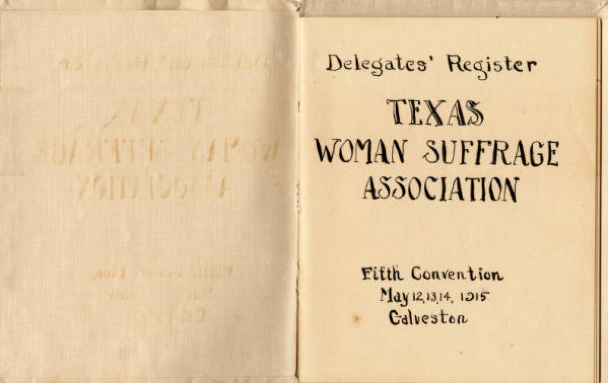Image from Heroes, Heroines and History.
The battle to win votes for Texas women was waged on multiple fronts over decades, just as it was on the national stage. While there was undoubtedly a coterie of high-profile leaders who made noteworthy individual contributions to the fight for suffrage, the movement’s impetus sprang from the collective efforts of thousands of women across the state who joined forces to demand their rights as citizens.
The role that women’s clubs and suffrage organizations played in this collective effort deserves star billing. With unflagging energy, their members organized events, wrote letters, lobbied legislators, and raised funds in support of their cause, often in defiance of the views of their family members or their communities.
The determination and single mindedness of purpose of Texas suffragists was fierce. Unfortunately, their commitment to universal cooperation was less so—at least in the case of the most prominent clubs and suffrage organizations, which were exclusive to white women. Although there were thousands of Texas women of color who were ready to join the battle, they were shut out and denied access. The considerable potential of this demographic, in terms of contributions, would go untapped until the civil rights movement decades later.
Some of the more notable Texas organizations that led the fight for suffrage included:
Texas Woman’s Christian Temperance Union (WCTU): Organized in the late 1880s, the Texas WCTU is noteworthy since its ranks also included African-American women, although they were confined to segregated wards and mostly operated independently. The WCTU is also noteworthy because at one time it was the largest women’s organization on the planet, with chapters across the U.S. and around the world. As the name suggests, the WCTU’s mission was to promote abstinence from alcohol, which many socially-conscious women of that era viewed as essential to the protection of home and family. But the group also took a strong interest in suffrage, and many of the founding officers of the Texas Equal Rights Association (see below) were also WCTU members.
Texas Equal Rights Association (TERA): This early suffrage group formed in Dallas in 1893 and soon spread to affiliates across the state. But after a few years of successful awareness building, the organization lost momentum and more or less ceased operations in 1896.
The Texas National Woman’s Party: Established in 1916, the Texas chapter of the NWP had active associations in Houston, El Paso, San Antonio and Corsicana. Although considerably smaller than the Texas Equal Suffrage Association (see below), the NWP managed to wield some influence. The group’s philosophy differed from the more moderate TESA, as it endorsed the national chapter’s “militant” tactics of picketing and occupation. The NWP also differed from TESA in its primary focus on federal suffrage.
Texas Association of Women’s Clubs (TAWC): The TAWC was organized as the Texas Federation of Colored Women’s Clubs in 1905. Along with the League of Women Voters (see below), TAWC is one of the few (if not the only) suffrage-related organizations still in existence today. TAWC promoted suffrage in addition to working in a number of areas of interest to African-American women—but since the organization was disenfranchised from collaborating with white women’s organizations, their ability to contribute was severely limited.
Texas Equal Suffrage Association (TESA): Founded in 1903 as the state chapter of the National American Woman Suffrage Association, TESA was the first statewide suffrage organization to emerge after the demise of TERA, and would remain a dominant force in the movement until the passage of the 19th Amendment. The group promoted federal as well as state suffrage, and sought to help local suffrage organizations build momentum for the cause in communities across the state. TESA played a major role in bringing about the impeachment of Governor James “Pa” Ferguson, a staunch anti-suffragist, and also supported the war effort. In 1919, following the ratification of the 19th Amendment in Texas, the group re-organized as the League of Women Voters of Texas [link to LWV spotlight].
Additional Reading:
“Woman Suffrage” from The Handbook of Texas Online
“Collective Power: Women’s Organizations” from the Austin History Center

